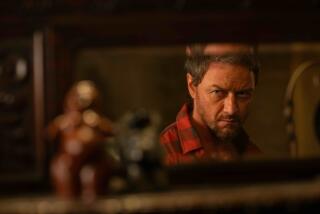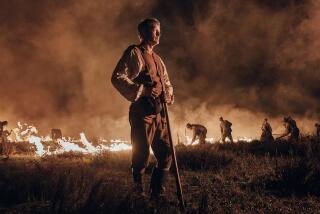Danes chose U.S. for film on armed pacifists
- Share via
Some Americans at the Toronto Film Festival asked Danish director Thomas Vinterberg, “What are you Danes doing making films about our country?”
“It may seem arrogant,” Vinterberg concedes, “but it’s not meant to be arrogant. It’s meant to be an invitational tap on the shoulder, a slight provocation, but not finger-pointing.”
The film provoking the question is “Dear Wendy,” which opens here Friday. With a script by fellow Danish filmmaker Lars von Trier (“Breaking the Waves”), Vinterberg weaves the tale of a group of teenagers -- all outcasts in a small American coal-mining town -- who form a gang called the Dandies, based on their love of guns and pacifism.
Jamie Bell of “Billy Elliot” plays Dick, the leader of the Dandies. The “Wendy” of the title is the small pistol he cherishes.
“I must say, I think the attraction with firearms is universal and goes through history,” Vinterberg says. “It’s not necessarily an American phenomenon. Of course, it’s tempting to set the story in America, where [gun-control issues] are a hot potato and there is a very, very liberal gun-control program, which worries a lot of people. So, therefore, it was obvious to place it there.”
But he hopes the film communicates on a larger level the “more general attraction to firearms. What is it about men and guns? It is this almost Freudian thing. That is what we are trying to explore in the film.”
The concept of pacifists embracing firearms, he says, isn’t far removed from countries’ peacekeeping missions around the world.
“What is this thing about the whole Western world -- including my country, by the way -- trying to maintain peace all the time but very well-equipped [with guns] to do it? That is the kind of question [Von Trier] is raising in a very, very precise way in his own microcosmic world in the script, which I found attractive.”
Vinterberg made changes in Von Trier’s original concept, including making the Dandies much younger. “They were in their 30s,” he says. “For me, Lars had subconsciously made a story about being young and disappointed with life, and trying to create something larger for yourself by creating an identity.”
It was inevitable that he would put his own stamp on the material, he says. “We ultimately are different, Lars and myself. He is more the mathematician. He is more occupied with being politically incorrect and creating as many harsh moral dilemmas as possible. I am more emotionally occupied with everyday life and character.”
-- Susan King
More to Read
Only good movies
Get the Indie Focus newsletter, Mark Olsen's weekly guide to the world of cinema.
You may occasionally receive promotional content from the Los Angeles Times.











